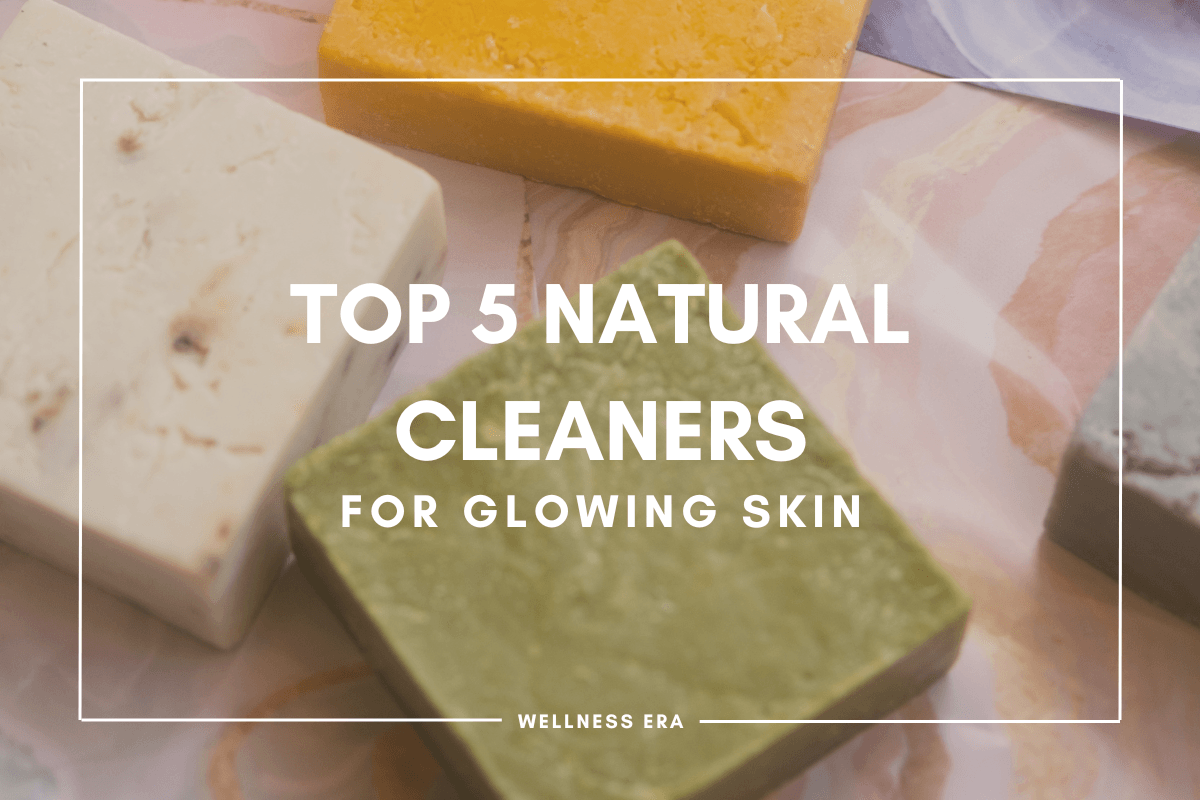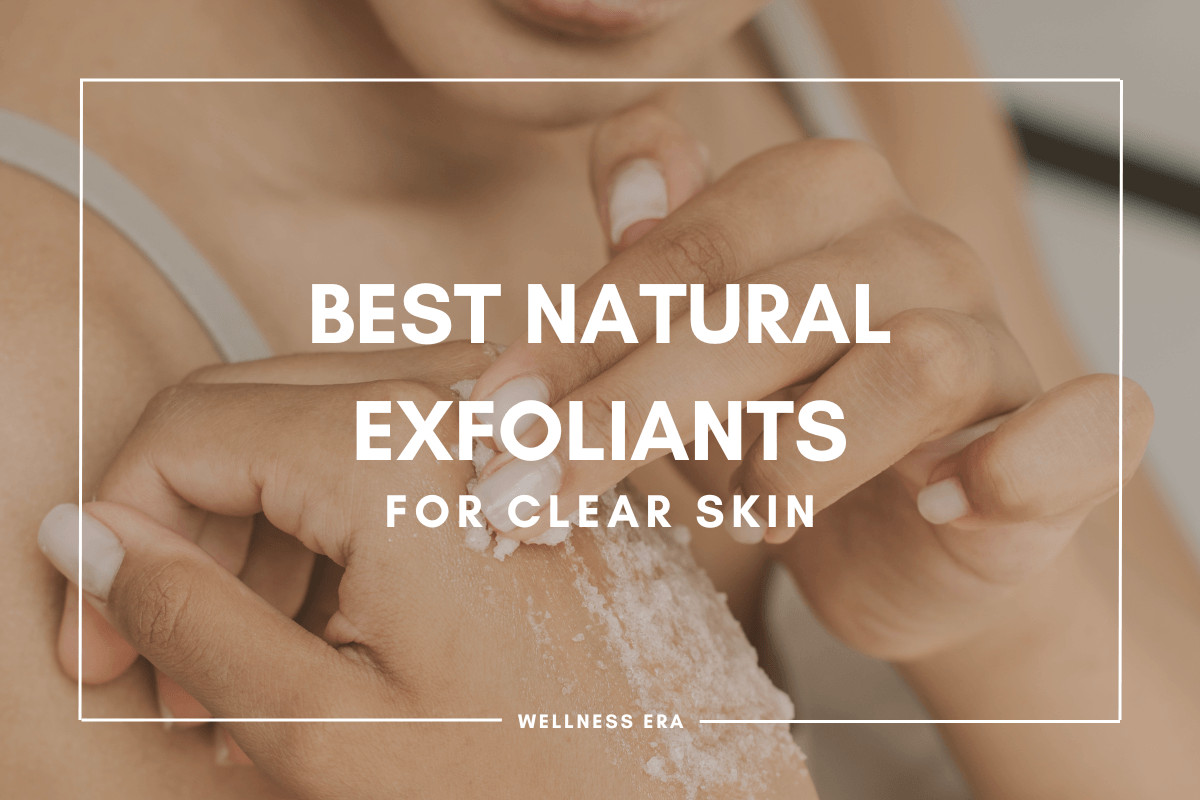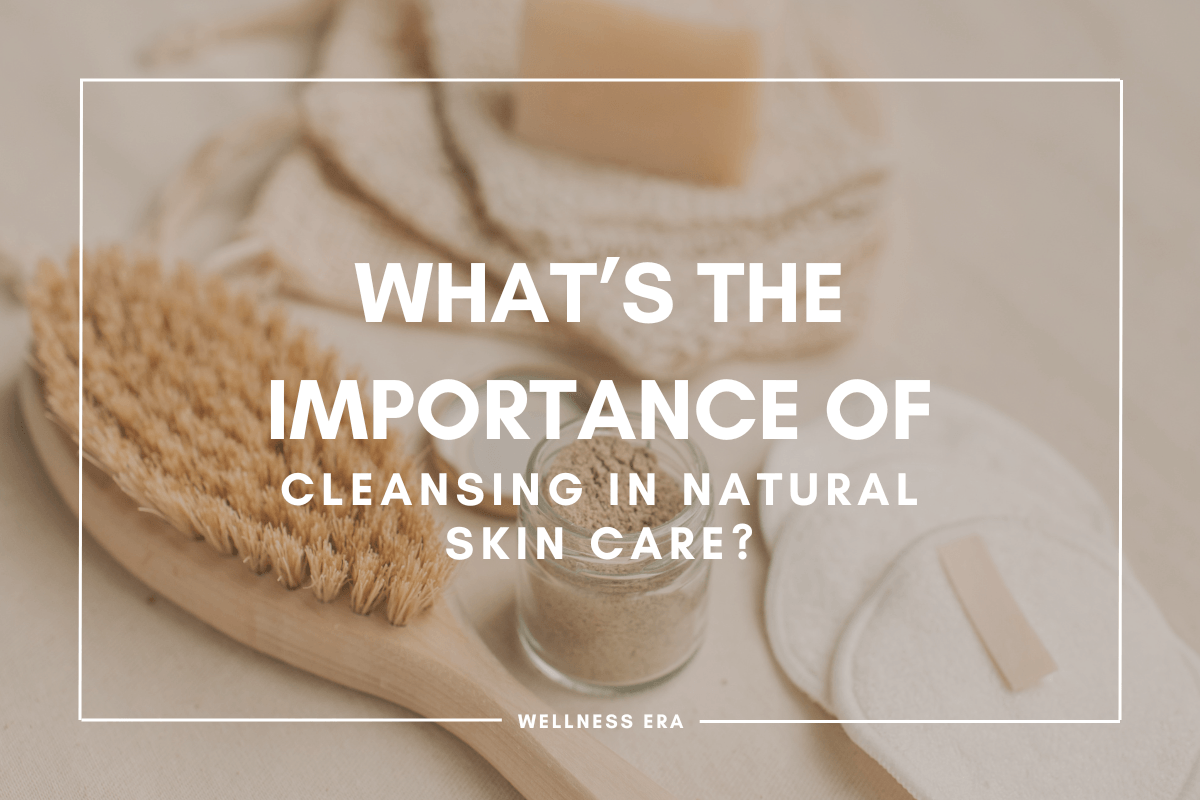Best Natural Moisturizers for Every Skin Type
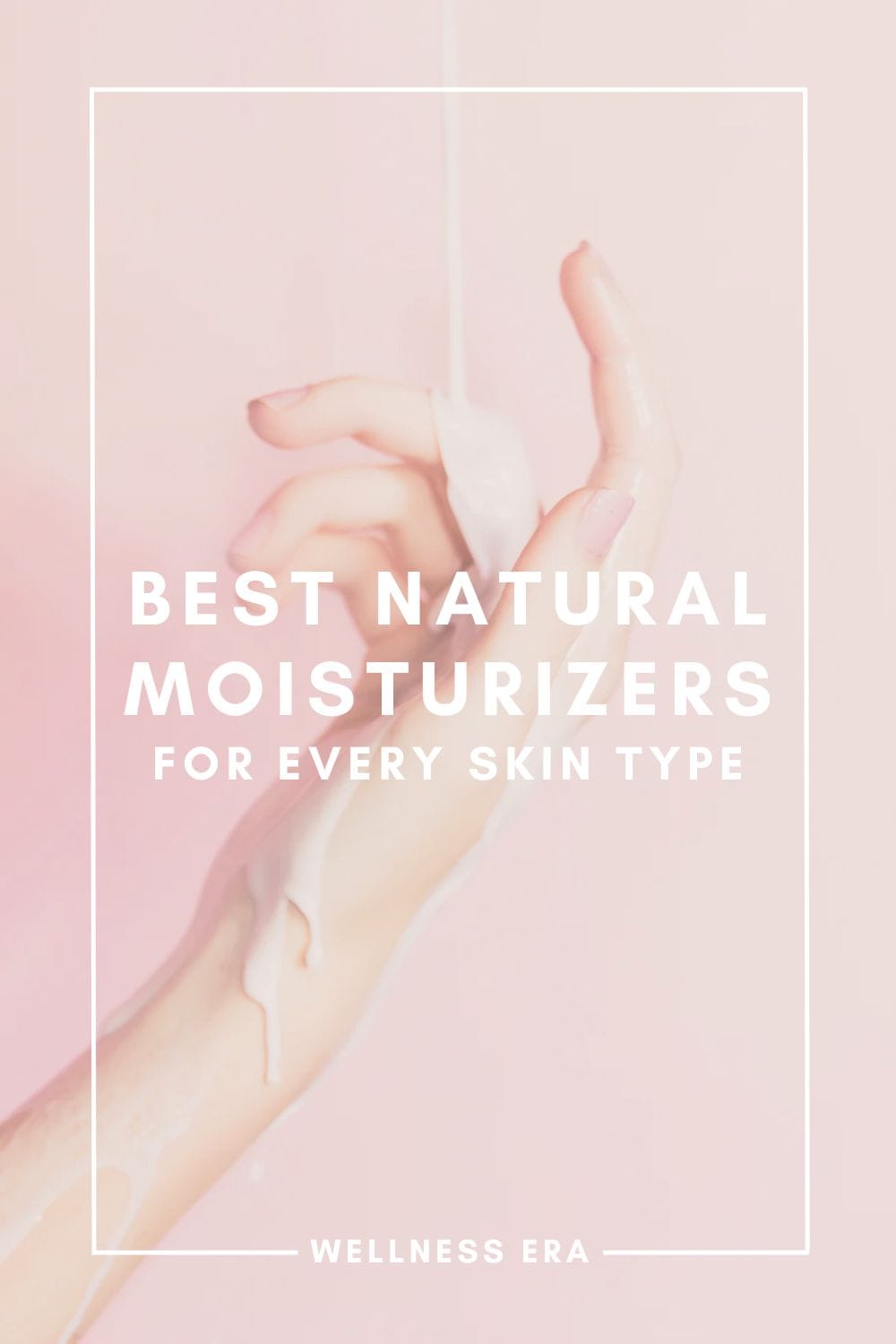
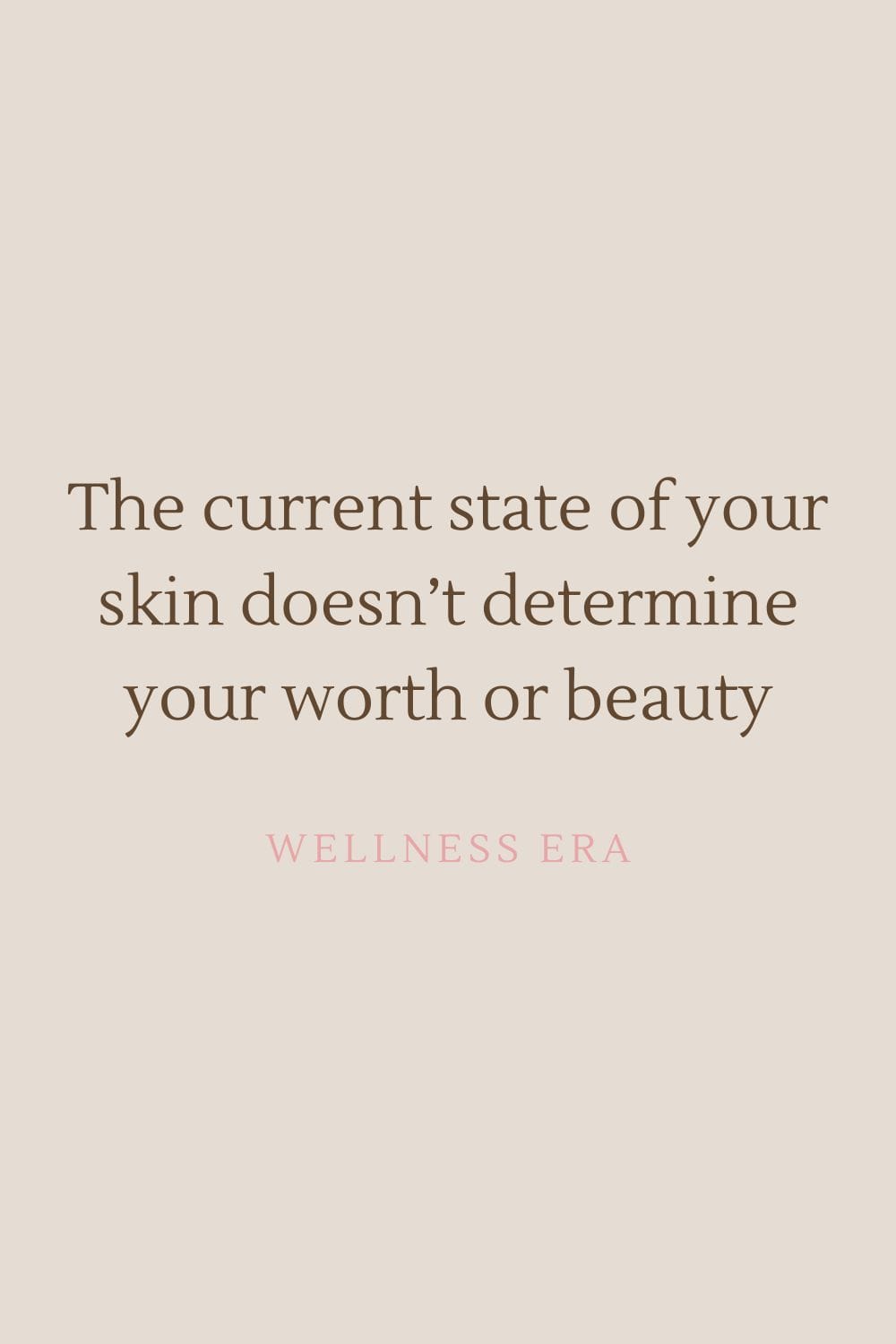
Choosing the right moisturizer is an essential part of any skincare routine, but finding the perfect one can be a challenge, especially when aiming for natural and toxin-free options. Natural skin care is gaining popularity for its commitment to using minimally processed, plant-based ingredients that support healthy, glowing skin without the harsh chemicals often found in conventional products. In this guide, we will help you discover the best natural moisturizers tailored to different skin types, so you can give your skin the hydration it needs while staying true to eco-friendly and sustainable skincare practices.
If you're new to natural skincare and want to build a routine with gentle, effective ingredients, check out ourComplete Guide to Natural Skin Care for Beginnersfor everything you need to know about starting a toxin-free regimen.
Whether you have dry, oily, sensitive, combination, or aging skin, the right natural moisturizer can make all the difference. Understanding your skin type and the benefits of natural products will enable you to choose the best moisturizer that aligns with your skin's unique needs. Let’s begin by exploring what natural skin care really means and why it is important for healthy, hydrated skin.
What Is Natural Skin Care
Natural skin care refers to products and practices that prioritize the use of ingredients derived from natural sources, such as plants, minerals, and naturally occurring compounds. These ingredients are minimally processed, often originating from renewable or organic sources, and formulated without synthetic chemicals, artificial fragrances, or potentially harmful preservatives like parabens or sulfates. The goal is to maintain the integrity of the natural ingredients, making them gentler on the skin and reducing the risk of irritation (Barel et al., 2009).
The appeal of natural skin care extends beyond just the ingredients. Many natural skin care brands emphasize eco-friendly practices, cruelty-free testing, and sustainable production methods. These products often incorporate botanical extracts, essential oils, and vitamins with claimed therapeutic benefits, such as antioxidant protection, anti-inflammatory effects, or hydration support. However, it is important to note that "natural" does not always mean safer or more effective, as some natural ingredients may still cause adverse reactions. Their efficacy largely depends on factors such as formulation, concentration, and skin type (Baran and Maibach, 2017).
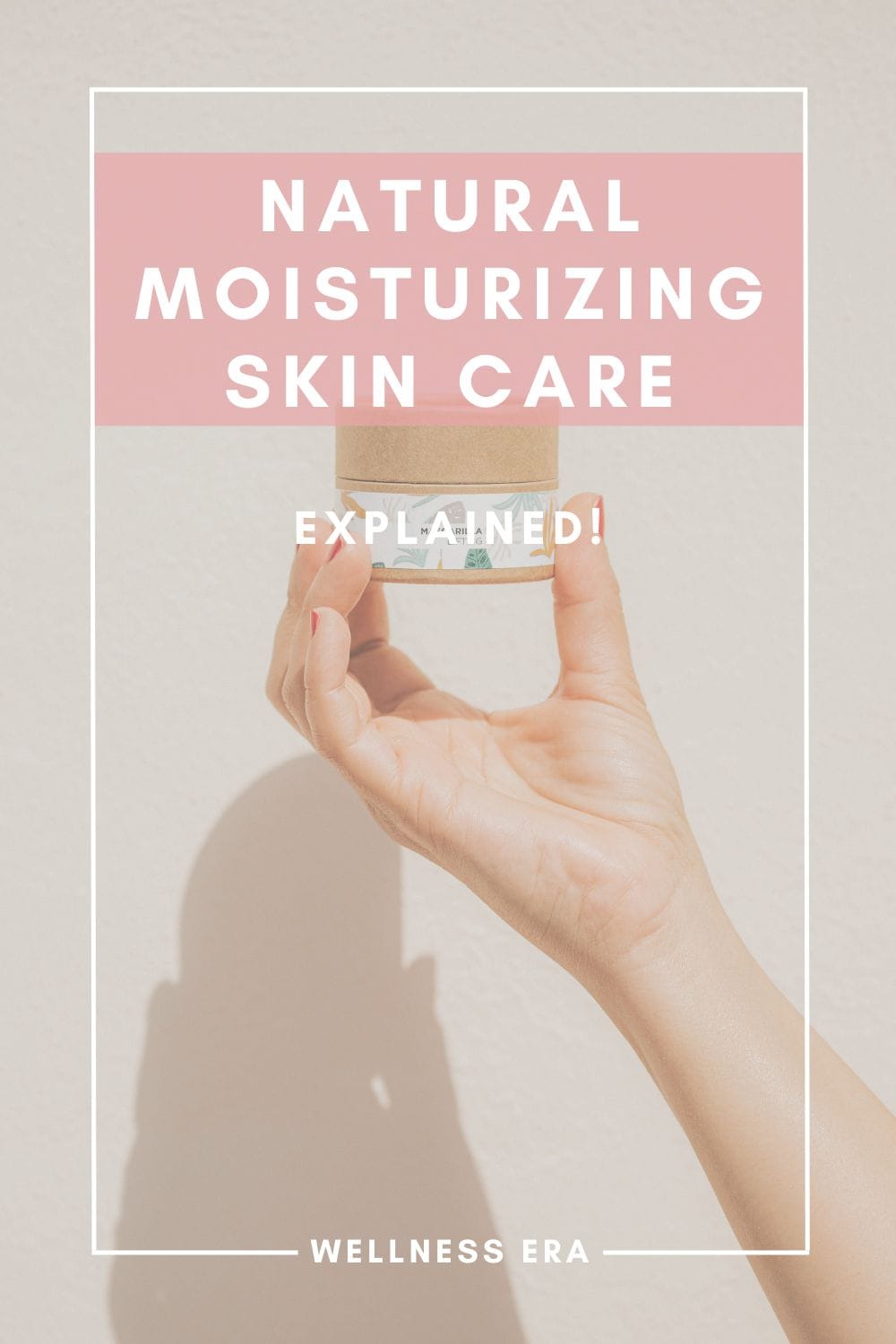
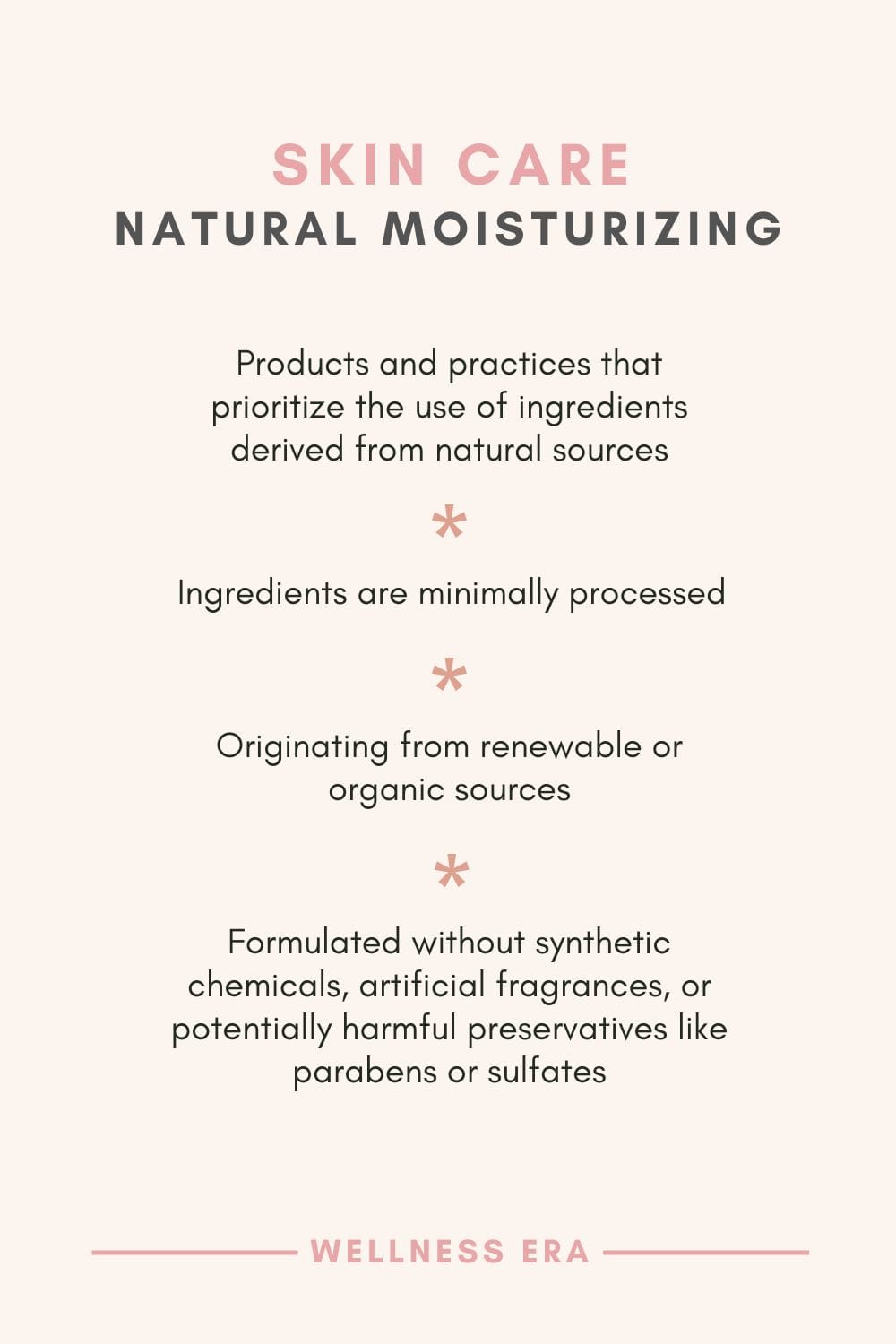
References
Barel, A.O., Paye, M. and Maibach, H.I., 2009. Handbook of Cosmetic Science and Technology. 3rd ed. Informa Healthcare. (URL: Taylor & Francis)
Baran, R. and Maibach, H.I., 2017. Textbook of Cosmetic Dermatology. CRC Press. (URL: Taylor & Francis)
Why Does Face Skin Need Moisturizing?
Moisturizing plays a crucial role in maintaining the overall health, balance, and appearance of your skin. Here are several reasons why keeping your face properly moisturized is essential:
Maintains Skin Hydration
The outermost layer of the skin, known as the stratum corneum, depends on adequate hydration to remain smooth, soft, and flexible. Moisturizers help to trap water in the skin, preventing dehydration and dryness. Without proper hydration, the skin may become tight, flaky, and more prone to irritation (Proksch et al., 2008).
Proper hydration is key to maintaining healthy, supple skin. Learn simple yet effective techniques in our guide on6 Steps to Hydrate and Combat Dryness of Skinto keep your skin nourished all day long.
Strengthens the Skin Barrier
The skin barrier (lipid barrier) acts as a protective layer that prevents harmful substances like bacteria, pollutants, and irritants from penetrating the skin. A compromised barrier, often caused by lack of moisture, makes the skin more susceptible to irritation and inflammation. Regular moisturizing replenishes the skin's natural lipids, helping maintain a healthy and resilient barrier (Barel et al., 2009).
Prevents Dryness and Flaking
Moisturizing helps combat trans-epidermal water loss (TEWL), the process by which water evaporates from the skin. This is particularly important in dry or cold environments, where the skin is more likely to lose moisture. Moisturizers that contain humectants such as glycerin or hyaluronic acid attract and retain moisture, keeping the skin supple and preventing dryness (Zasada et al., 2019).
Balances Oil Production
Even oily skin benefits from moisturization. When the skin lacks adequate moisture, it can overproduce sebum in an attempt to hydrate itself, potentially leading to clogged pores and breakouts. Using a lightweight, non-comedogenic moisturizer helps balance oil production while providing necessary hydration (Proksch et al., 2008).
Promotes Skin Repair
Exposure to UV rays, pollution, and other environmental factors can damage the skin. Moisturizers often contain ingredients like antioxidants, vitamins, and fatty acids that aid in the repair and regeneration of the skin, reducing redness and inflammation caused by daily stressors (Baran and Maibach, 2017).
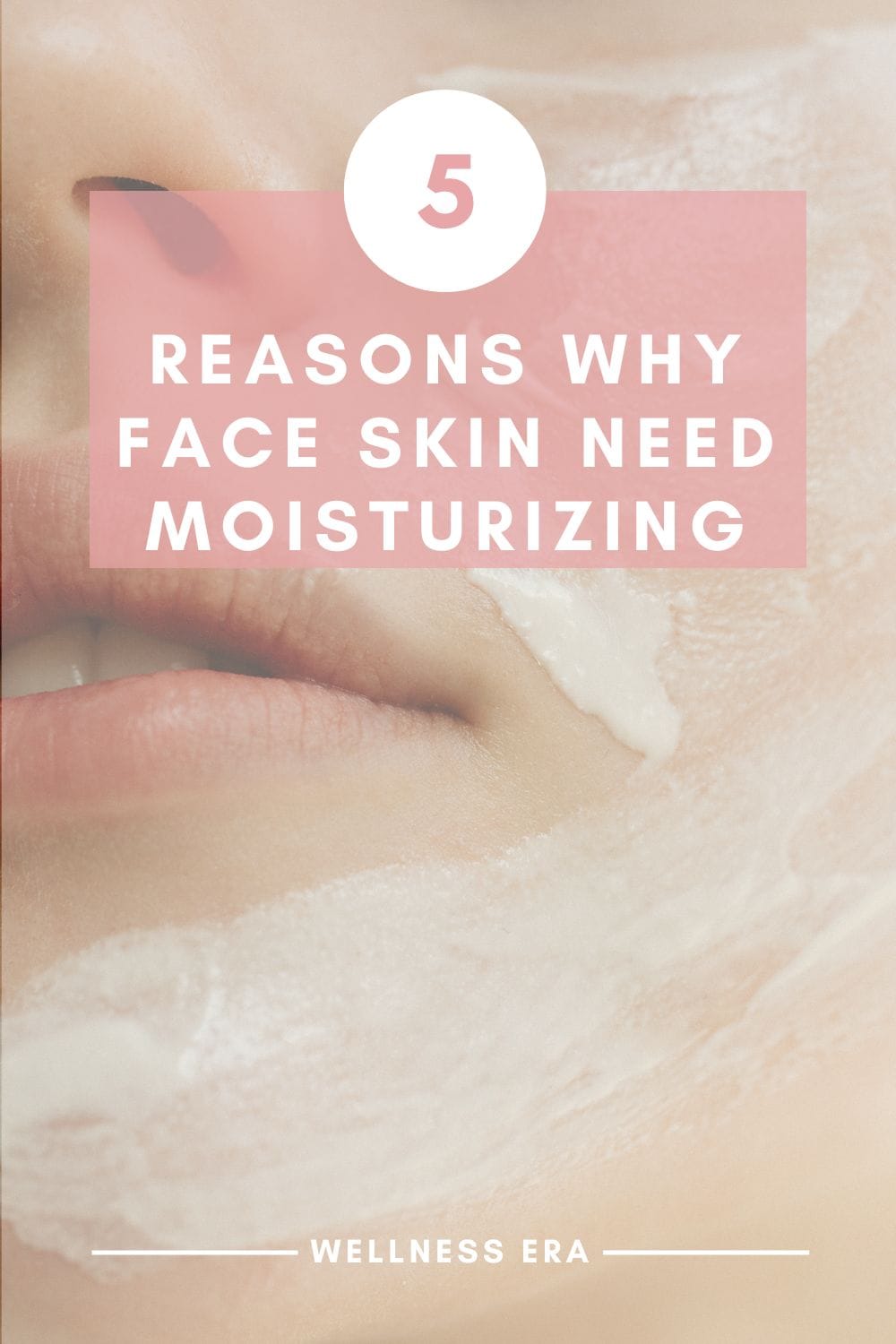
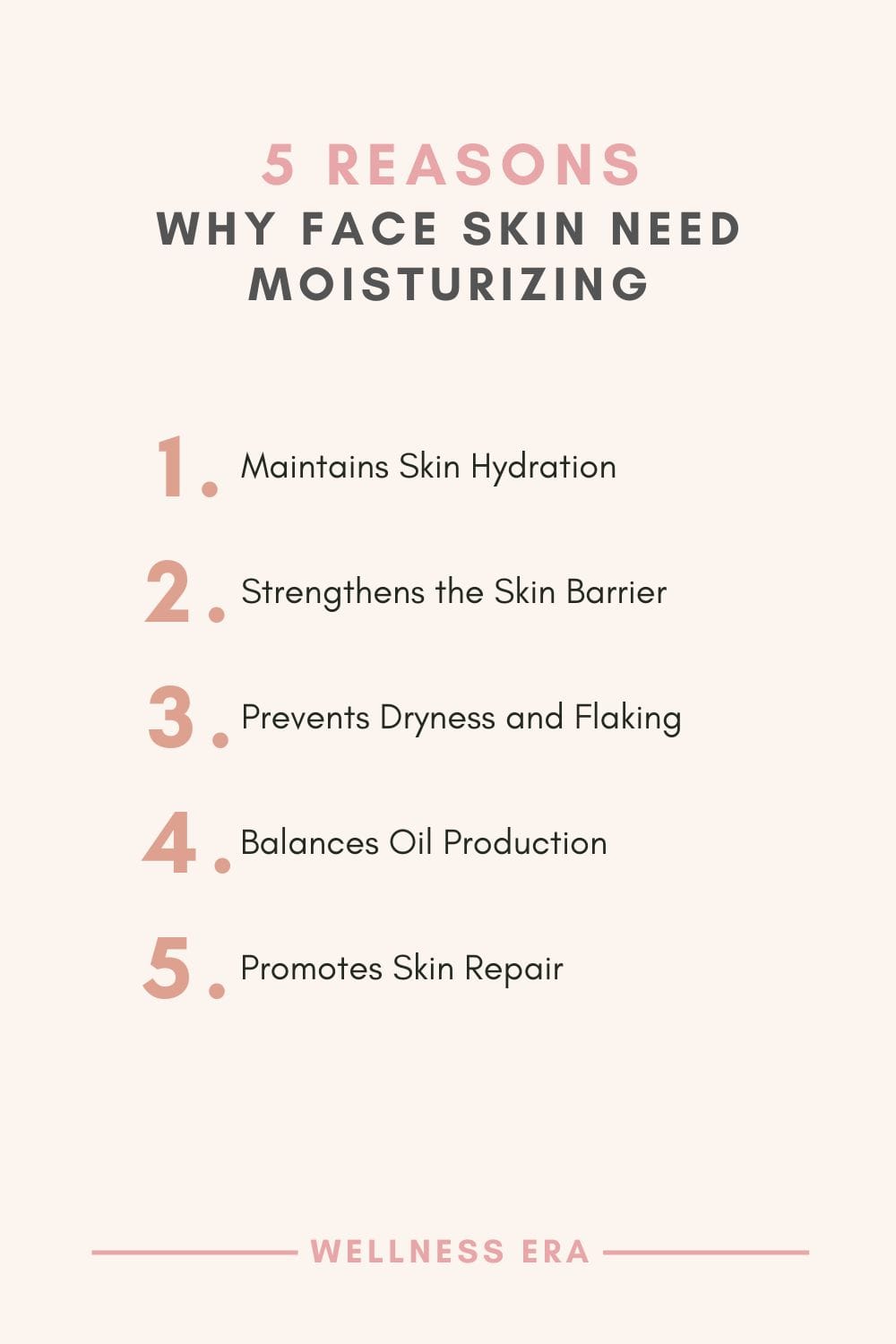
Slows Down the Signs of Aging
As we age, our skin’s natural production of collagen and elastin decreases, leading to the appearance of fine linesand wrinkles. Moisturizers containing anti-aging ingredients such as hyaluronic acid and peptides help maintain hydration, improving skin elasticity and reducing the visibility of aging signs (Zasada et al., 2019).
Collagen and elastin are crucial for maintaining youthful skin. Discover natural ways to support and protect these essential proteins in our article on7 Natural Remedies to Boost Collagen Production.
Improves Skin Texture and Appearance
Properly hydrated skin looks brighter, smoother, and more radiant. Moisturizers fill in the tiny spaces between skin cells, creating a soft, smooth texture. Hydrated skin also reflects light better, giving it a natural glow, whereas dry skin often appears dull (Barel et al., 2009).
Supports the Healing of Sensitive or Damaged Skin
For those with conditions like eczema, rosacea, or acne, moisturizing can help soothe irritation and support skin healing. Ingredients such as aloe vera, shea butter, and ceramides provide nourishment and aid in repairing the skin barrier (Proksch et al., 2008).
Prevents Skin Problems Like Acne and Irritation
A well-moisturized skin barrier helps keep the skin balanced, reducing the likelihood of excess oil production, clogged pores, and acne. Proper hydration also minimizes irritation and itching associated with dry skin (Zasada et al., 2019).
Protects Against Environmental Damage
Many moisturizers include antioxidants like vitamin C, vitamin E, or green tea extract, which shield the skin from free radical damage caused by UV rays, pollution, and other stressors. The protective layer formed by moisturizers helps safeguard the skin from harsh environmental conditions (Baran and Maibach, 2017).
Pollution, UV rays, and toxins can cause oxidative stress and premature aging. Learn how to protect your skin with powerful antioxidants in our guide onFighting Free Radicals with Antioxidants.
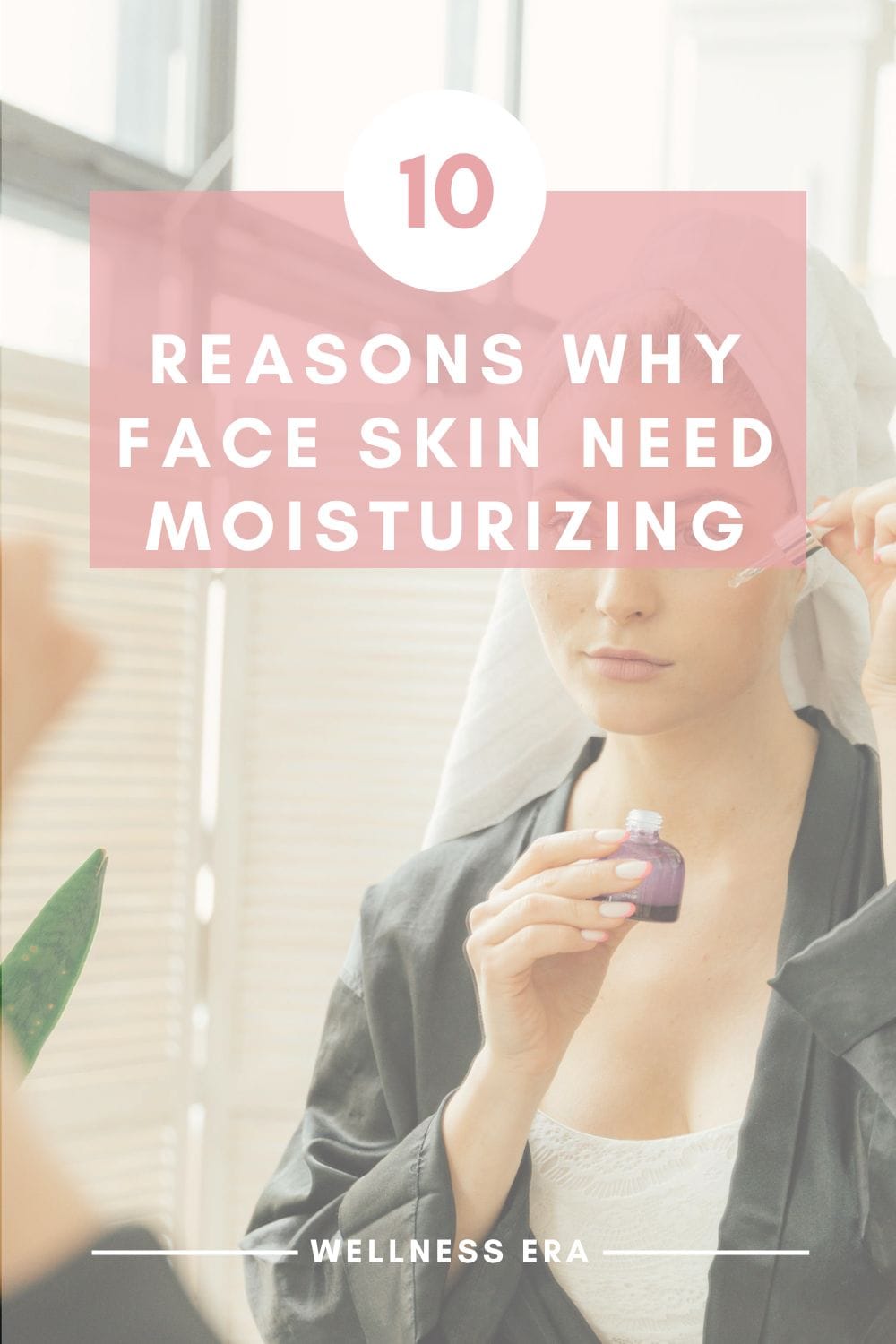
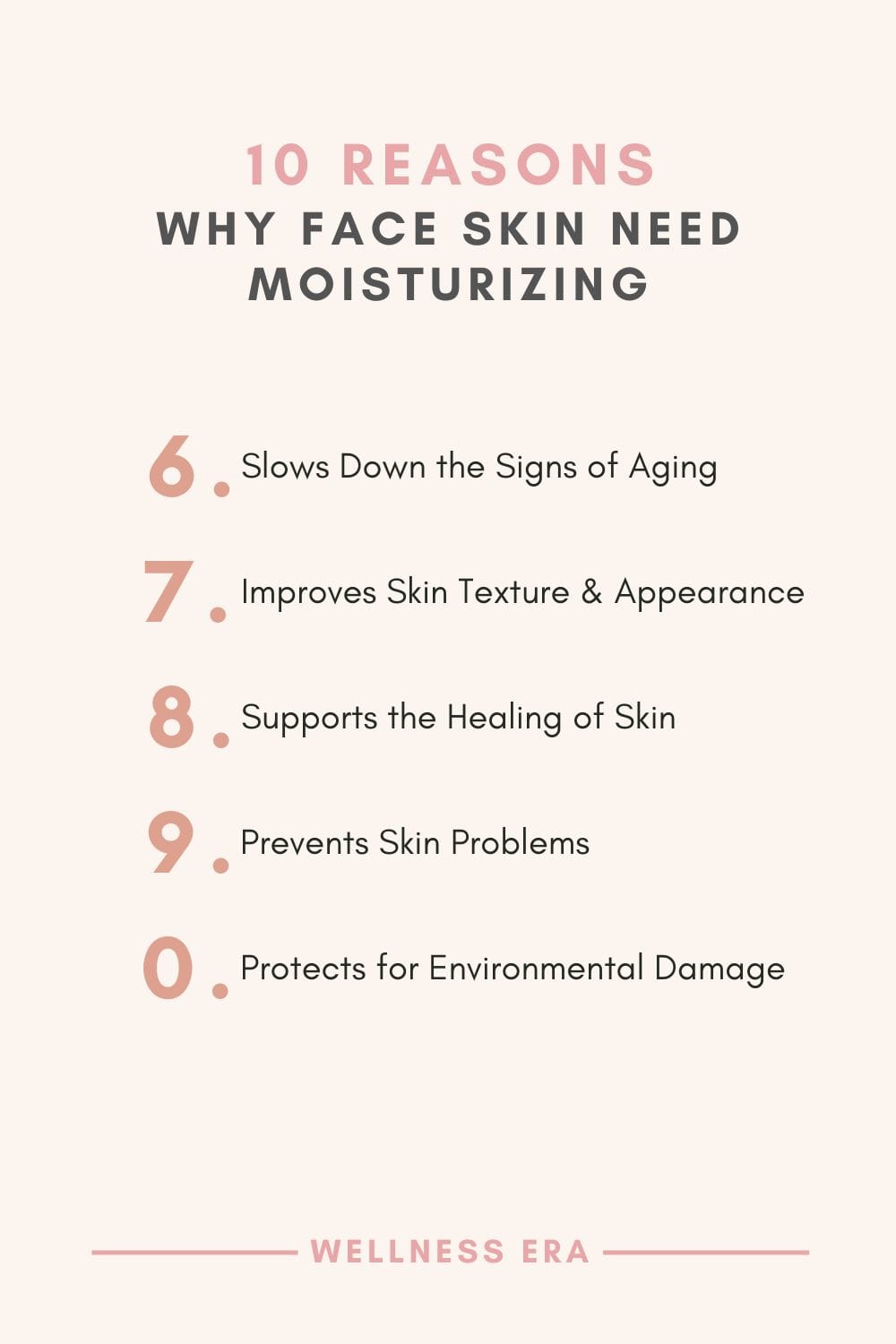
If you’re beginning to embrace a more natural approach to skincare—or if you’ve ever wondered how to nourish your skin without relying on harsh chemicals—you’re not alone. Prioritizing natural wellness starts with small, mindful changes, like the way you care for your skin. For a deeper dive into how to moisturize your skin naturally, this article is packed with practical tips and expert advice to guide you. It will answer all those burning questions about natural hydration and help you create a routine that truly honors your skin’s unique needs.
References
Barel, A.O., Paye, M. and Maibach, H.I., 2009. Handbook of Cosmetic Science and Technology. 3rd ed. Informa Healthcare. (URL: Taylor & Francis)
Baran, R. and Maibach, H.I., 2017. Textbook of Cosmetic Dermatology. CRC Press. (URL: Routledge)
Proksch, E., Brandner, J.M. and Jensen, J.M., 2008. The skin: an indispensable barrier. Experimental Dermatology, 17(12), pp.1063-1072. (URL: Wiley Online Library)
Zasada, M., Budzisz, E. and Rotsztejn, H., 2019. Antioxidants in moisturizing cosmetics. Postepy Dermatologii i Alergologii, 36(3), pp.352-359. (URL: Europe PMC)
What Kind of Products Can Be Used for Natural Moisturizing of the Face?
When it comes to natural moisturizing, the options extend beyond conventional creams and lotions. Natural moisturizers use ingredients sourced from plants, minerals, and other naturally occurring substances to hydrate, nourish, and protect the skin. These products offer an array of benefits without the synthetic chemicals found in many commercial moisturizers. Here’s an overview of different types of natural moisturizers that can be used to keep the skin healthy and hydrated:
Carrier Oils
Carrier oils are plant-based oils that provide hydration and nutrients to the skin. They are rich in essential fatty acids, vitamins, and antioxidants, making them suitable for various skin types. Each oil has unique properties that cater to specific skin needs:
Jojoba Oil: Resembles the skin's natural sebum, making it ideal for all skin types, including oily and acne-prone skin. It helps regulate oil production and moisturizes without clogging pores (Baran and Maibach, 2017).
Rosehip Oil: Packed with vitamin A and vitamin C, this oil helps with skin regeneration, brightening, and anti-aging. It's suitable for dry and mature skin (Zasada et al., 2019).
Argan Oil: High in vitamin E and fatty acids, providing deep moisture and protection. Ideal for dry and sensitive skin (Barel et al., 2009).
Grapeseed Oil: Lightweight and rich in linoleic acid, making it suitable for oily and acne-prone skin. It absorbs quickly without leaving a greasy residue (Proksch et al., 2008).
Essential Oils
Essential oils are concentrated plant extracts that can be added to carrier oils or natural moisturizers for additional benefits. They must be diluted before application:
Lavender Oil: Known for its calming effects, it helps soothe irritated or sensitive skin (Barel et al., 2009).
Tea Tree Oil: Offers antibacterial and anti-inflammatory properties, making it beneficial for acne-prone skin(Zasada et al., 2019).
Frankincense Oil: Has anti-aging properties and can help reduce the appearance of fine lines (Baran and Maibach, 2017).
Natural Butters
Butters provide rich hydration and are ideal for dry or mature skin:
Shea Butter: Contains vitamins A and E, which help repair and moisturize the skin. It's suitable for dry, mature, and sensitive skin (Proksch et al., 2008).
Cocoa Butter: An excellent emollient that smooths and softens the skin, helping to improve skin elasticity (Barel et al., 2009).
Mango Butter: Lighter than shea and cocoa butter, it offers deep hydration without feeling heavy, making it suitable for most skin types.
Tallow
Grass-fed tallow is rich in fatty acids that resemble the skin’s natural lipids. It deeply nourishes and helps repair the skin barrier, making it suitable for dry, sensitive, or mature skin, especially in harsh climates (Baran and Maibach, 2017).
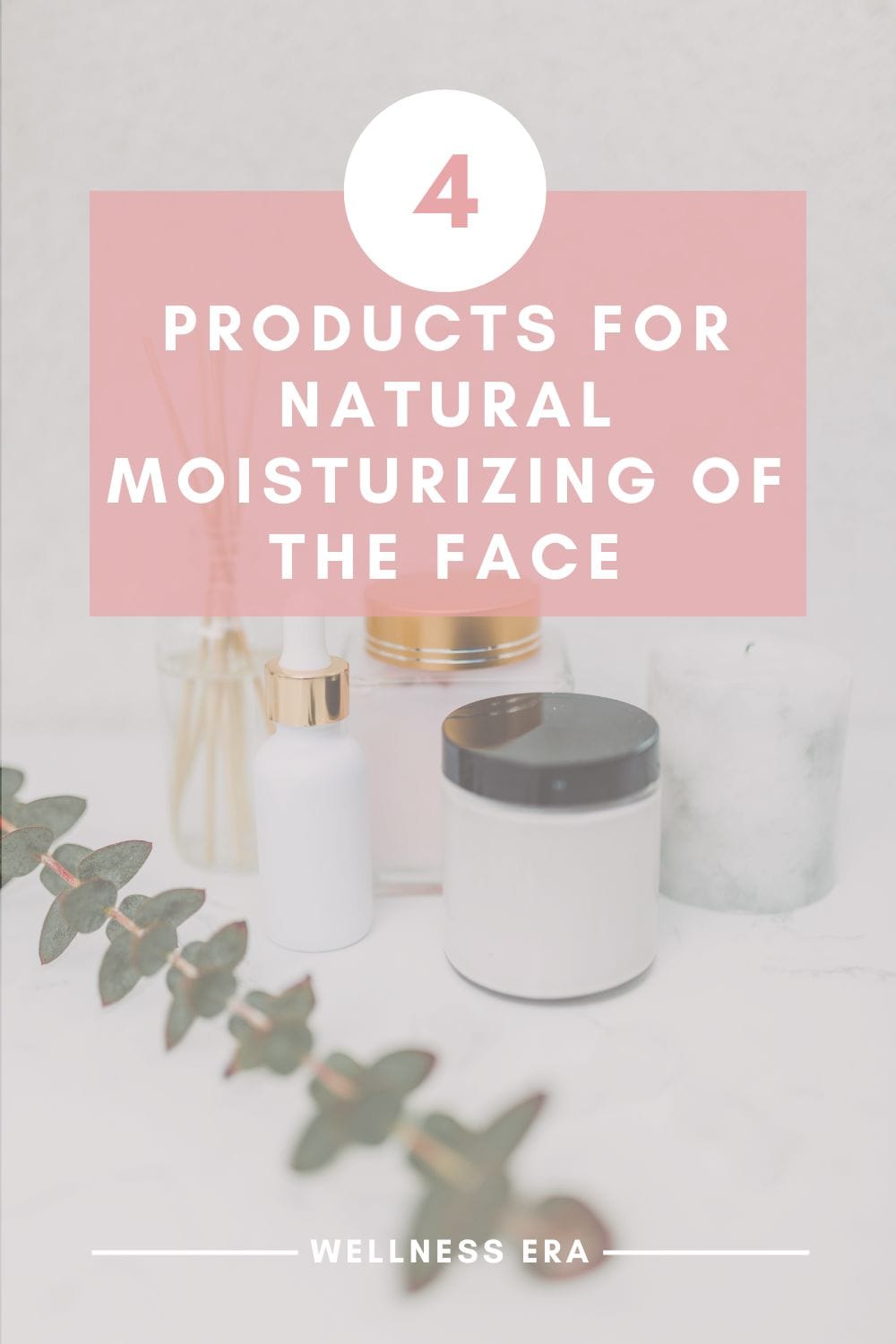
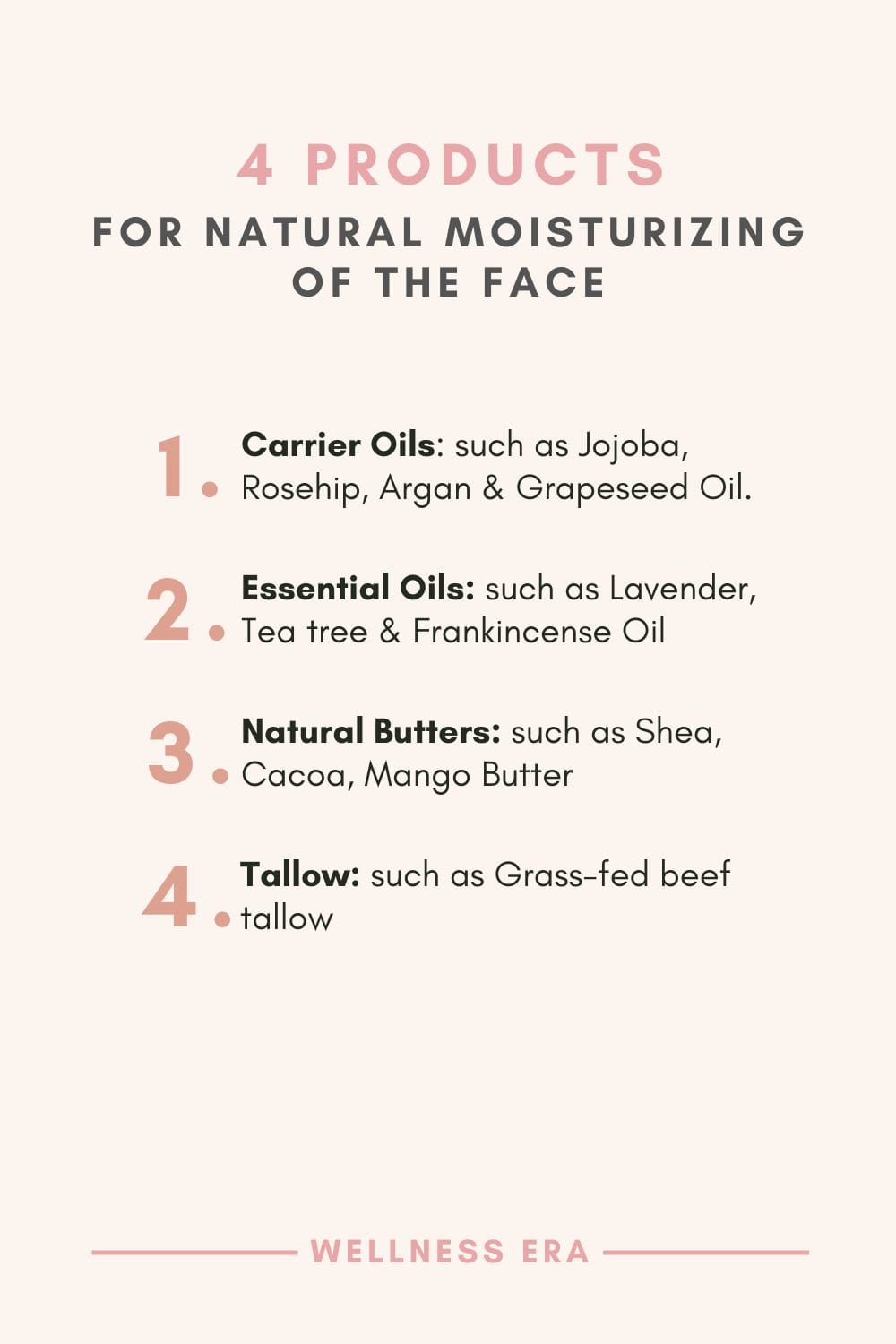
Balms
Balms are thicker moisturizers that form a protective barrier on the skin:
Beeswax-based Balms: Create a natural barrier to lock in moisture, suitable for dry or chapped skin (Proksch et al., 2008).
Calendula Balm: Contains calendula extract, which has healing and anti-inflammatory properties, making it ideal for sensitive or irritated skin (Zasada et al., 2019).
Gels
Gels are lighter in texture and are often water-based, making them suitable for oily or acne-prone skin:
Aloe Vera Gel: Known for its soothing and hydrating properties, aloe vera gel is beneficial for all skin types, especially for calming redness or sunburn (Barel et al., 2009).
Cucumber Gel: Provides a cooling effect and hydrates without leaving a greasy residue, ideal for sensitive or dehydrated skin (Proksch et al., 2008).
Hydrosols (Floral Waters)
Hydrosols are the mild byproducts of essential oil distillation and can be used as toners or light moisturizers:
Rose Water: Soothes and hydrates, making it beneficial for sensitive or mature skin (Baran and Maibach, 2017).
Chamomile Water: Reduces redness and soothes irritation, ideal for sensitive skin (Zasada et al., 2019).
Honey and Honey-based Products
Raw honey acts as a natural humectant, drawing moisture into the skin. It also has antibacterial properties, making it suitable for acne-prone skin (Barel et al., 2009).
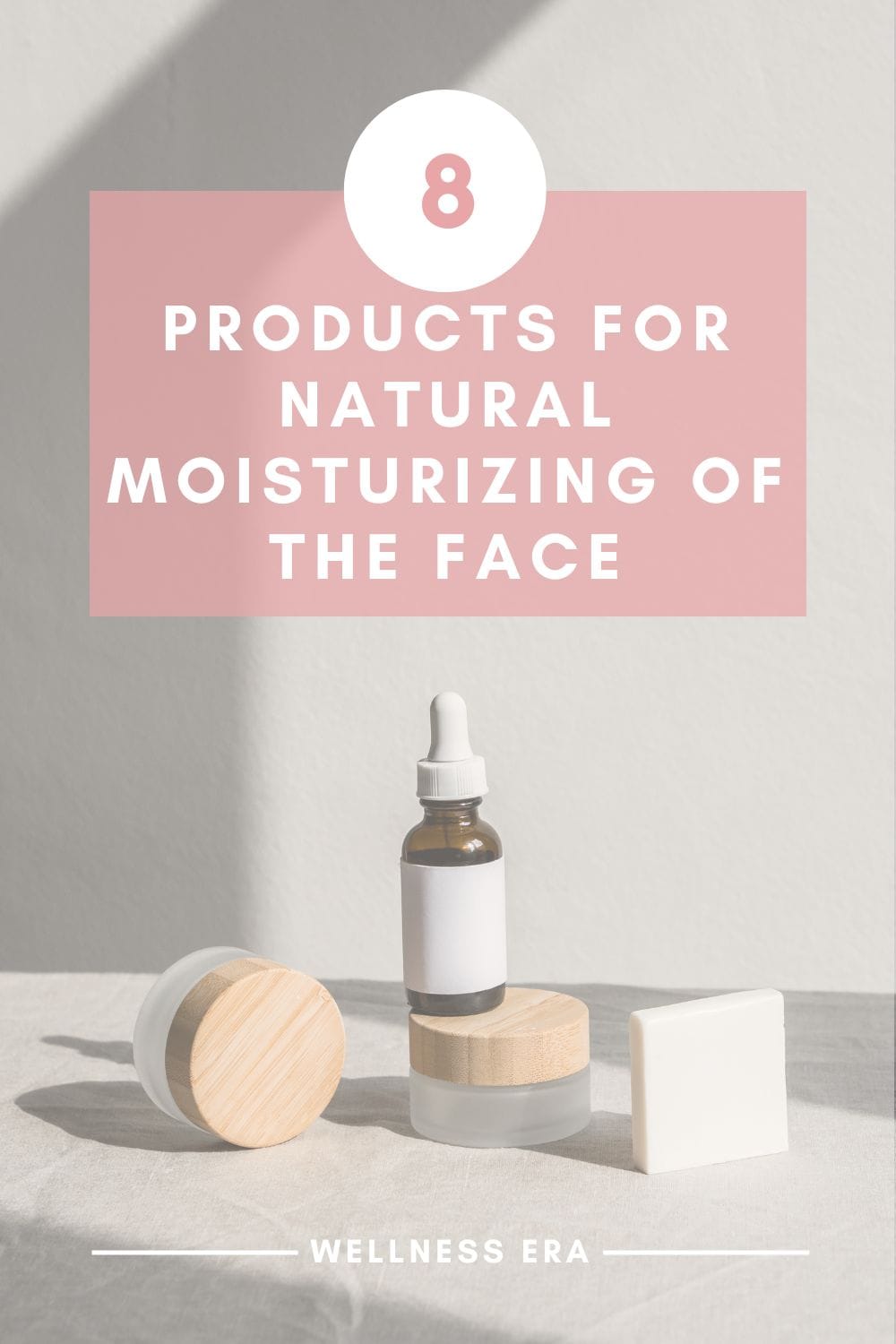
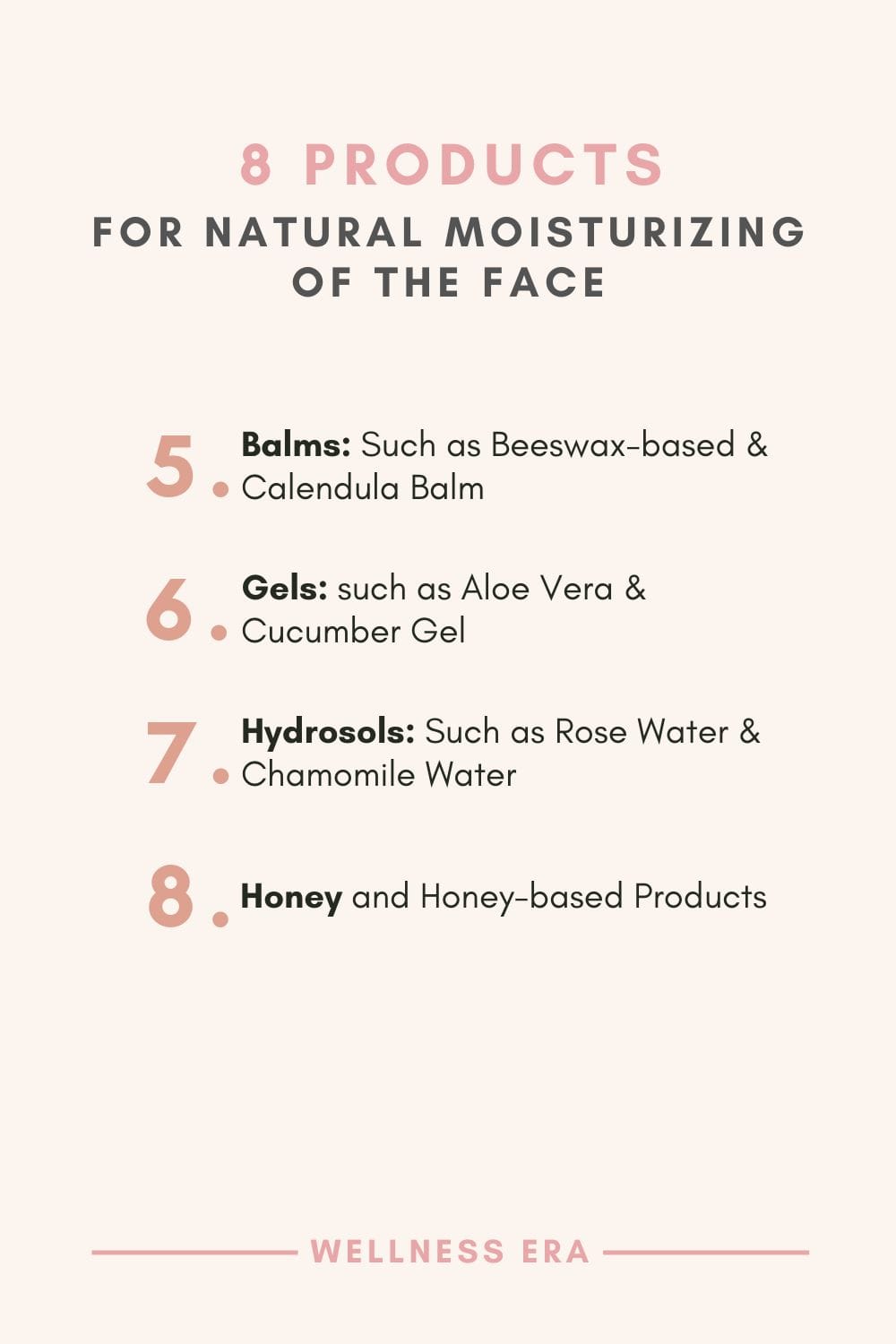
References
Barel, A.O., Paye, M. and Maibach, H.I., 2009. Handbook of Cosmetic Science and Technology. 3rd ed. Informa Healthcare. (URL: Taylor & Francis)
Baran, R. and Maibach, H.I., 2017. Textbook of Cosmetic Dermatology. CRC Press. (URL: Routledge)
Proksch, E., Brandner, J.M. and Jensen, J.M., 2008. The skin: an indispensable barrier. Experimental Dermatology, 17(12), pp.1063-1072. (URL: Wiley Online Library)
Zasada, M., Budzisz, E. and Rotsztejn, H., 2019. Antioxidants in moisturizing cosmetics. Postepy Dermatologii i Alergologii, 36(3), pp.352-359. (URL: Europe PMC)
Discover the Perfect Natural Moisturizer for Your Unique Skin Type
Choosing the right moisturizer isn’t a one-size-fits-all process—your skin type plays a crucial role in determining the best formula for optimal hydration and nourishment. To help you find your perfect match, we’ve curated detailed guides for every skin type, each packed with recommendations for the best natural moisturizers.
Dry Skin Moisturizing
For dry skin, natural moisturizers like tallow, butters (shea, cocoa, and mango), and oils (avocado, rosehip, sweet almond, and olive) offer a rich source of hydration, helping to replenish lost moisture, improve skin texture, and strengthen the skin barrier. Incorporating these natural products into a daily skincare routine can significantly enhance skin health, keeping it hydrated, smooth, and comfortable.
Dry Skin? Struggling with flakiness or tightness? Check out our blog on the Best Natural Moisturizers for Dry Skin to learn about these deeply hydrating solutions that restore softness and elasticity.
Oily Skin Moisturizing
For oily skin, the best natural moisturizers include lightweight oils like jojoba, grapeseed, and hemp seed oil, as well as soothing gels like aloe vera and cucumber gel. Honey serves as a great humectant to draw moisture into the skin while keeping acne at bay. Incorporating these natural products can help balance oil production, prevent breakouts, and keep the skin hydrated without making it greasy.
Oily Skin? Combat excess shine and clogged pores with lightweight, balancing options, read all about it in ourBest Natural Moisturizers for Oily Skin blog article.
Sensitive Skin Moisturizing
For sensitive skin, the best natural moisturizers include gentle oils like jojoba and squalane, soothing butters such as shea and mango, nourishing tallow, and calming hydrosols like rose water and chamomile. These products help provide hydration while reducing irritation and supporting a healthy skin barrier, making them ideal for daily use on sensitive skin.
Sensitive Skin? These gentle and soothing options await you in our Best Natural Moisturizers for Sensitive Skin blog, perfect for calming redness and irritation.
Combination Skin Moisturizing
For combination skin, the ideal natural moisturizers are those that can balance sebum production while providing hydration to dry areas. Using oils like jojoba, argan, and grapeseed, as well as gels like aloe vera and cucumber, along with hydrating hydrosols such as rose or lavender, can help keep the skin balanced and nourished. Adjusting the skincare routine to address each area’s specific needs ensures a healthy and harmonious complexion.
Combination Skin? You need a moisturizer that caters to both oily and dry areas! Explore it in ourBest Natural Moisturizers for Combination Skin blog to keep your skin balanced and happy.
Aging Skin Moisturizing
Aging skin often faces dryness, fine lines, and reduced elasticity, but natural moisturizers can help restore hydration and vitality. Ingredients like pomegranate seed oil, shea butter, and rose hydrosol provide deep moisture, support collagen production, and protect against environmental damage. By layering hydrosols, oils, and butters, you can lock in hydration and nourish aging skin effectively. These natural options not only improve elasticity and texture but also promote a radiant, youthful glow while embracing sustainable skincare practices.
Aging Skin? For mature skin that craves hydration and anti-aging benefits, check out these top picks in the Best Natural Moisturizers for Aging Skin guide.
Each guide offers tailored insights and product recommendations to help you achieve healthy, radiant skin while staying true to natural skincare principles. Click through to explore the best options for your skin type!
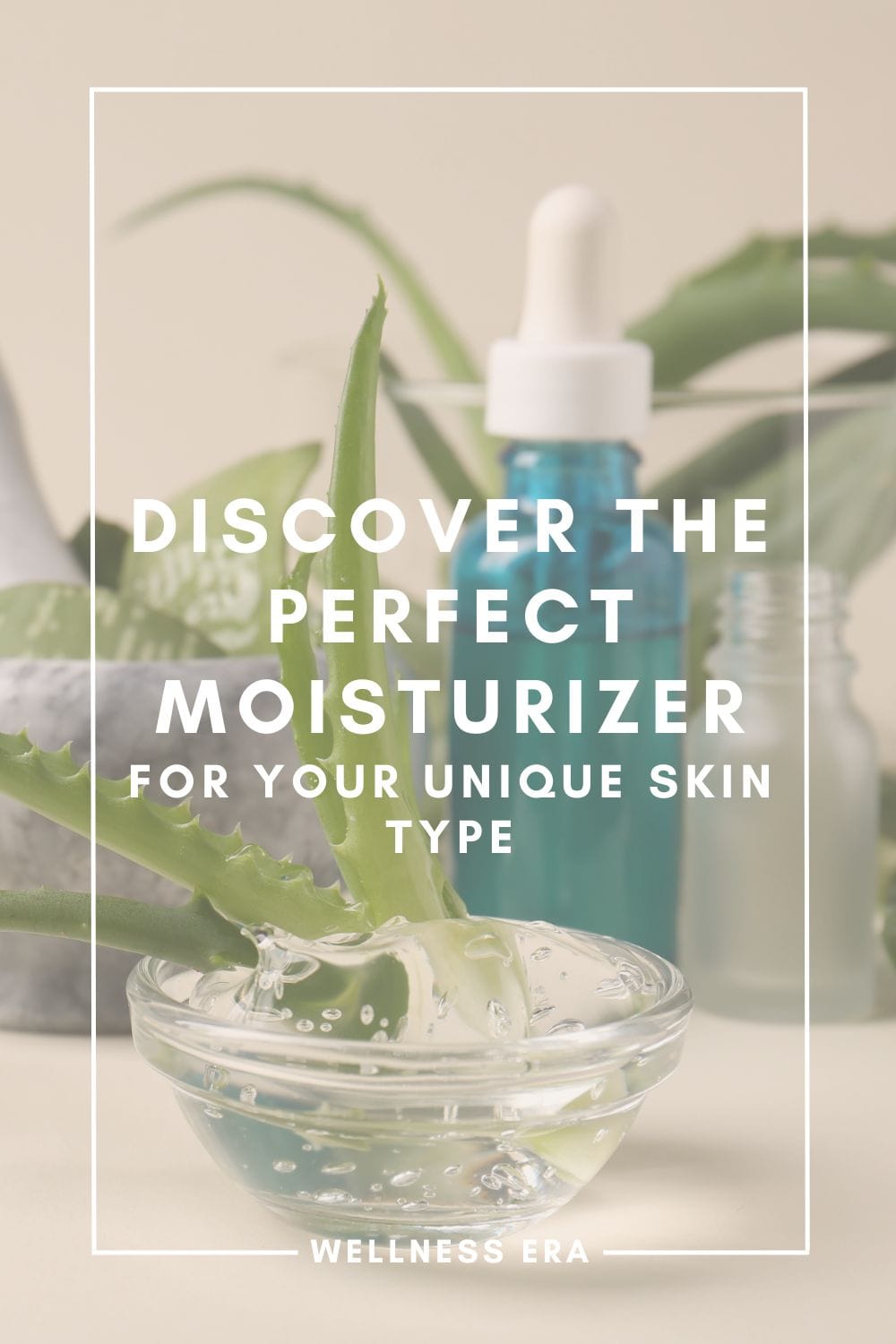
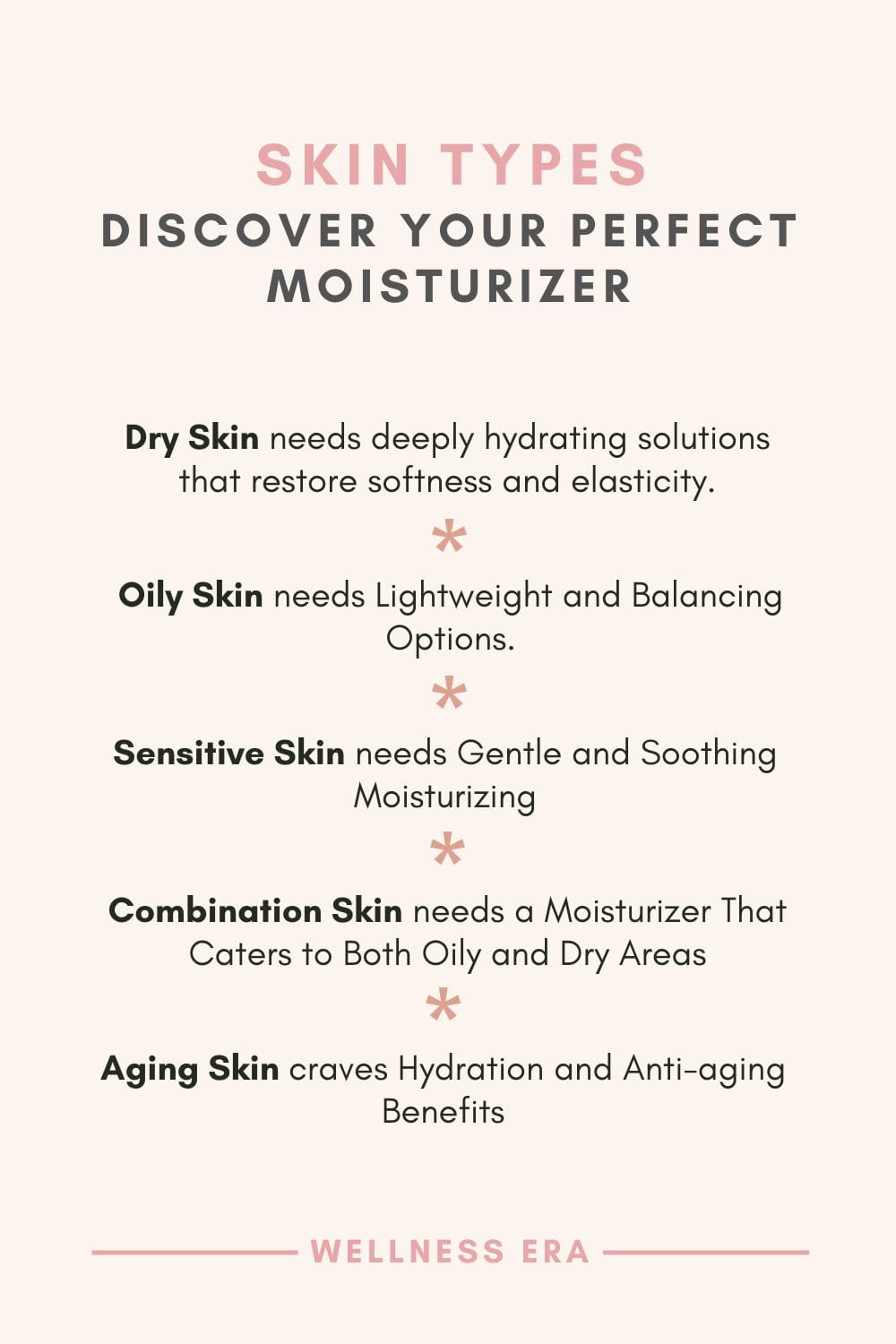
Embrace the Power of Natural Hydration
Choosing the right natural moisturizer for your skin type can be transformative in maintaining a healthy, balanced complexion. Understanding whether your skin is dry, oily, sensitive, combination, or aging allows you to tailor your skincare routine to address specific needs and optimize hydration. By incorporating natural ingredients like oils, butters, gels, and hydrosols, you can nourish and support the skin barrier without harsh chemicals or synthetic additives. The key to effective natural skin care is adjusting your approach based on how your skin feels, making use of layering techniques, and choosing ingredients that work harmoniously with your skin’s unique characteristics.
Natural skincare is not only about keeping the skin hydrated; it's also a holistic approach to wellness that embraces simplicity, nourishment, and sustainable beauty practices. When you embrace natural moisturizers tailored to your skin type, you're investing in a routine that supports not just your skin’s health, but your overall well-being.
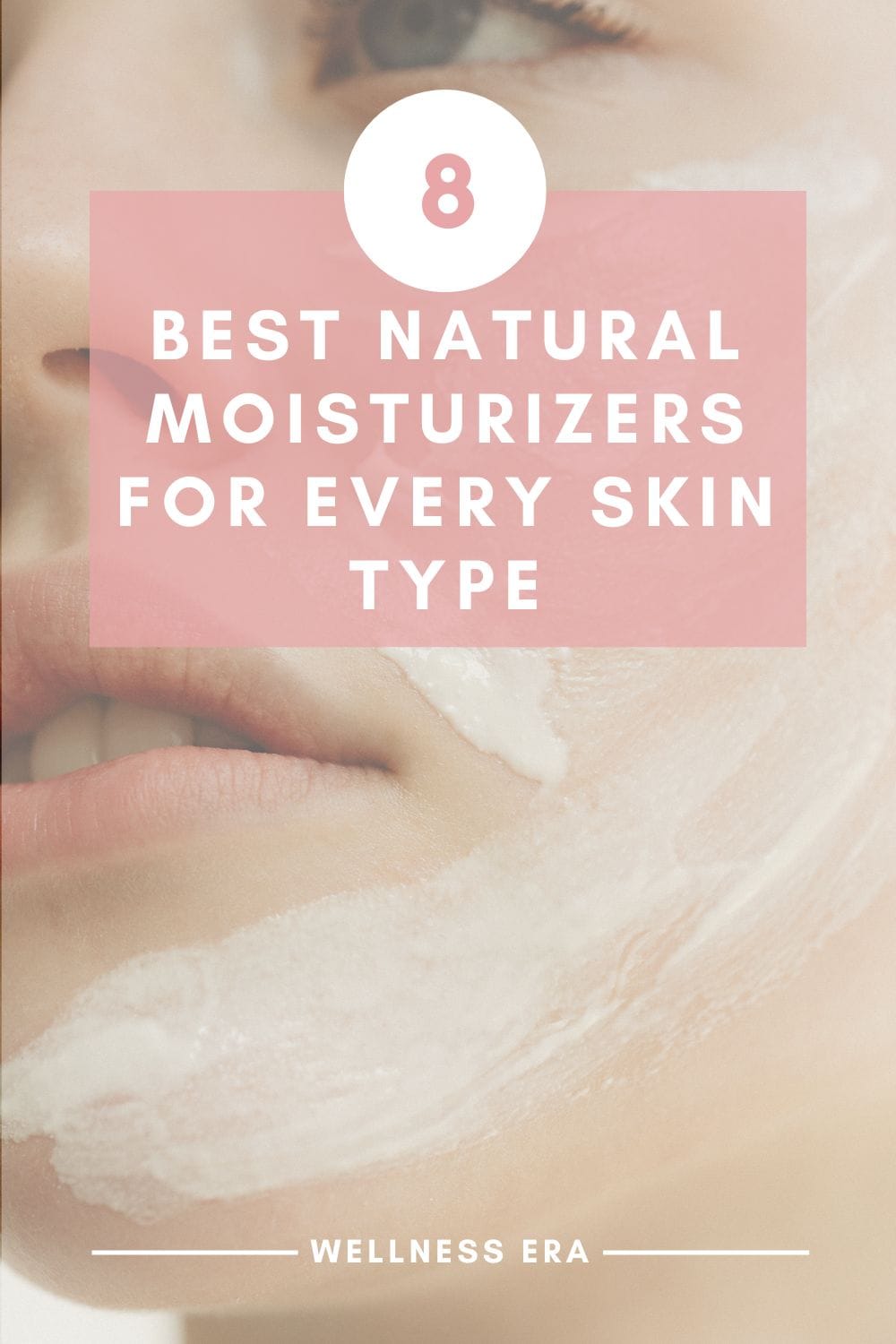
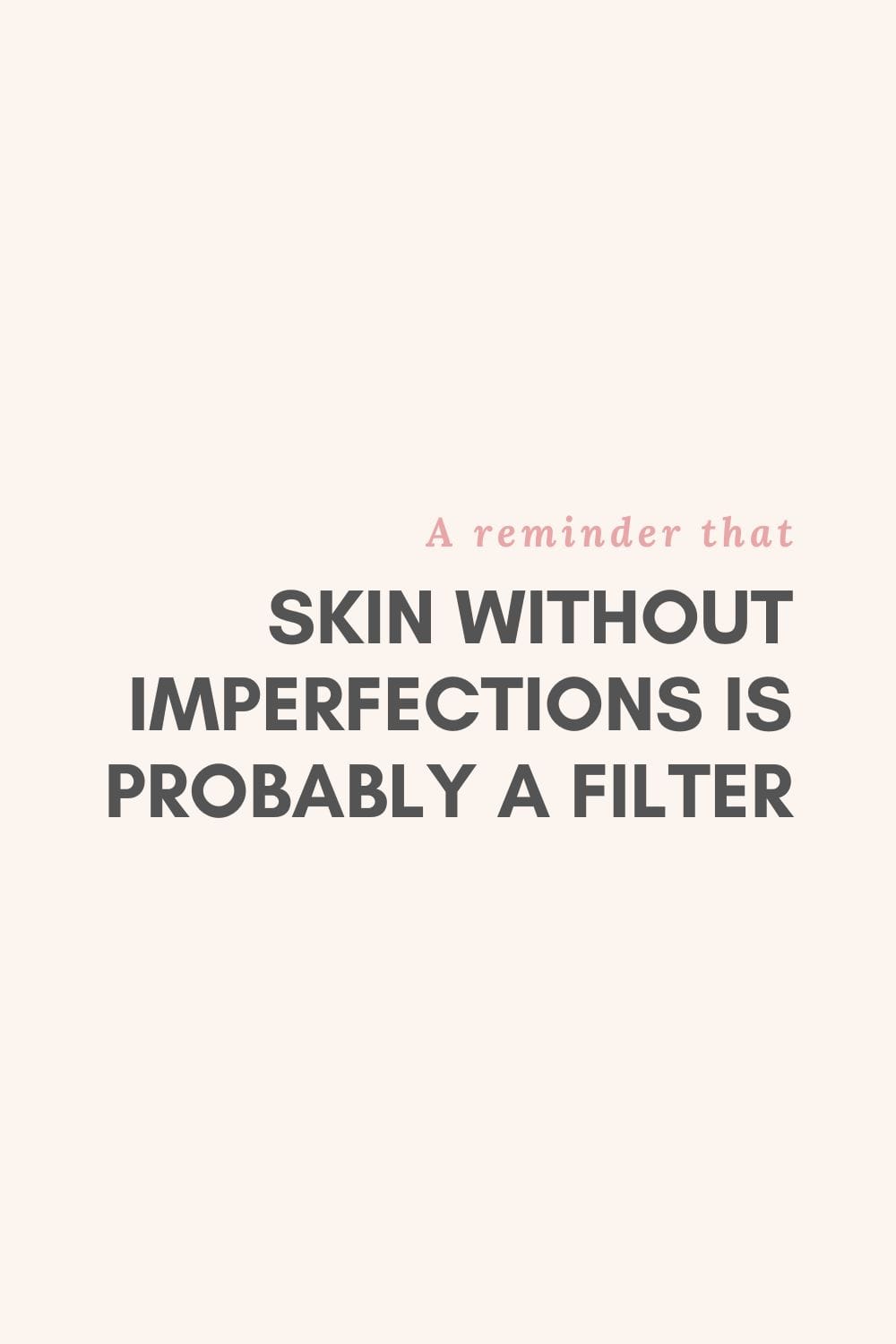
Frequently Asked Questions (FAQ)
Can natural moisturizers really improve aging skin?
Yes, natural moisturizers can significantly benefit aging skin. Oils rich in vitamins and fatty acids, such as rosehip or pomegranate seed oil, help support collagen production, enhance skin elasticity, and reduce the appearance of fine lines. Butters like shea and mango offer deep hydration, which can plump up the skin and soften wrinkles. Regular use of these ingredients helps nourish the skin and slow the signs of aging.
Looking for more ways to keep your skin youthful and radiant? Explore the most effective natural solutions in our guide onThe Best Natural Remedies for Aging Skin.
How can I balance combination skin using natural moisturizers?
For combination skin, it’s important to use different products on different areas of the face. Apply lightweight, non-comedogenic oils like jojoba or grapeseed on the T-zone to control excess oil, while using richer oils or butters, such as rosehip oil or shea butter, on the drier areas. Layering products starting with hydrosols, followed by oils, and finishing with a light gel or cream, can help balance the skin's needs effectively.
Are there any natural moisturizers that should be avoided for oily skin?
Yes, heavy and comedogenic oils, such as coconut oil or cocoa butter, can clog pores and increase greasiness in oily skin. It’s better to opt for lightweight, fast-absorbing oils like grapeseed, hemp seed, or jojoba oil, which hydrate without causing breakouts. Gels like aloe vera can also help keep oily skin moisturized while reducing excess shine.
Struggling with excess oil production? Learn how to balance and care for your skin with ourStep-by-Step Guide to Managing Oily Skin Naturally.
How often should I apply natural moisturizers for the best results?
The frequency of moisturizing depends on your skin type and environmental conditions. Generally, moisturizing twice a day—morning and night—is effective for most skin types. In dry or cold climates, or if you have dry skin, you may benefit from an additional application during the day. Always apply moisturizers after cleansing to lock in hydration.
Can sensitive skin react to natural moisturizers?
Sensitive skin can still react to natural ingredients, especially essential oils or extracts that may cause irritation. It’s crucial to patch-test any new product on a small area of the skin before full application. Opt for gentle, fragrance-free oils like sweet almond, jojoba, or calendula, and soothing hydrosols like chamomile or rose, which are generally safe for sensitive skin.
If you experience redness, irritation, or sensitivity, it's important to use calming ingredients. Discover soothing skincare tips in our guide onReducing Inflammation Naturally for Smoother Skin.
Here is something you might also like..
Would you like to receive something special?
Try out the best, inspirational weekly newsletter for your natural wellness era!
My Wellness Era Weekly
SUBSCRIBE TO OUR NEWSLETTER
Your Weekly Dose of Natural Wellness
Fill out the form below, and you will reveice "My Wellness Era Weekly" delivered to your inbox.
What you can expect: a short, warm, and personal note from our founder. Mindset shifts, journal prompts, or self-care reminders. Inspiring quotea related to wellness, mindfulness, or self-love. Small, actionable wellness habits you can try. Recomendations we love, are testing, or recently discovered. Highlights of our latest blog posts.
+++ What we’re loving every single week.
QUICK LINKS
SOCIAL
CATEGORIES



